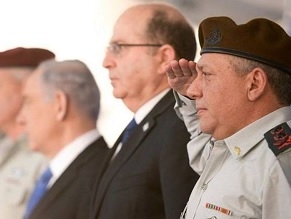|
World Jewish News

IDF chief of staff Gadi Eisenkot (R), Defense Minister Moshe Ya'alon, and Prime Minister Benjamin Netanyahu. (photo credit:GPO)
|
'We must be ready for the possibility of war with Iran in 10 - 15 years'
02.12.2015, Israel and the World On a day to day basis, the IDF is busy in the West Bank dealing with Palestinian terrorism and violence, but behind the scenes, its senior command is thinking ahead, assessing long-term regional threats.
According to one senior source from the IDF's Planning Directorate, the military has to be ready for the possibility of a state-to-state conflict with Iran in ten to fifteen years, when the nuclear deal expires, or for the possibility of a much-sooner conflict with Hamas in Gaza.
To that end, the Gideon multi-year working plan, as approved by IDF Chief of Staff Lt.-Gen. Gadi Eisenkot, seeks to place war readiness and training at the heart of the IDF's activities, as well as ensuring that there is sufficient ammunition, fuel, and preparations for any range of potential conflicts.
The process has been aided by the fact that the IDF no longer has to plan for engaging Iran's nuclear program in the immediate future.
The source stressed, however, that the IDF's military force build-up would from now on be based on "capabilities, not one one specific scenario," an approach that is better suited to the unpredictable region surrounding Israel.
The IDF's Gideon multi-year plan will ensure, the source said, that "people [running the IDF] won't say, in ten years, that the military wasted its time," the source said.
The plan is based on taking into account the growth of hybrid terrorist-guerrilla forces that are all around Israel's borders, the collapse of several regional states, the arms race raging among Middle East states that have survived the current chaos, and the growth of precision guided firepower in Hezbollah's weapons stockpiles, which underline the vulnerability of Israeli strategic sites.
Meanwhile, in Arab states, civil nuclear power programs have begun, pointing to a potential Arab nuclear arms race with Iran in the future.
Iran's military industries are set to grow dramatically over the coming decade, with the lifting of economic sanctions, and some of the weapons that will roll off Iranian mass production lines will find their way to Tehran's proxies in the region, particularly, Hezbollah.
"Our strategic depth is shrinking," the source warned.
In response to these developments, the Gideon plan, which awaits cabinet approval in the coming weeks, will institute a set of far-reaching reforms in the IDF, aimed at making it more efficient, flexible, and adaptable to emerging threats.
The ongoing IDF budgetary fluctuations, which have occurred in the vacuum left by the absence of a long-term working plan, have been destructive, and led to the creation of Gideon, the source said.
The plan's central aim is to prioritize the goal of war readiness and training, at the expense of future acquisitions, after a period of many new acquisition programs.
This means keeping ammunition warehouses and spare parts full, and maintaining a full combat training program, the source stated.
"Today, our ammunition stocks are better than they were before Operation Protective Edge [in 2014]," the source said.
"The Ground Forces Training Center [in Tzelim, in the Negev] has seen a crazy rate of training in 2015, and this will continue," the source said.
Additionally, the plan will seek to develop further inter-branch connectivity, promote the IDF command and control network that can connect a fighter jet pilot to a tank crew, and make structural changes that will eliminate duplicate, wasteful activities.
To that end, the Ground Forces will be merged with the Technological and Logistics Branch, the General Staff will shrink by 11 percent, and 40,000 career officers will be let go by 2017.
The General Staff will distribute its budgetary control powers to the IDF's three branches, allowing greater flexibility, according to the source.
In 2016, the IDF will unveil its Cyber Defense Branch, which will be separated from Military Intelligence's Unit 8200.
According to the Gideon plan, the Israel Navy will settle for 5 rather than six submarines.
The Home Front Command will shut down its Jerusalem district, and two reserve artillery battalions, whose equipment is too old to maintain, will also be closed.
After the IDF invested hundreds of millions of shekels in border sensor technology, the military will reduce the size of its Beduin tracking units. These and many other changes will occur if the cabinet approves the Gideon plan.
"We are carrying out continuous, daily security missions - but we have to plan ahead," the source said.
By YAAKOV LAPPIN
JPost.com
|
|
